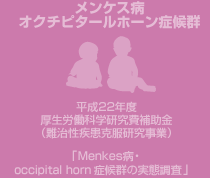
Name of the disease/symptom
Menkes disease
Number of Patients
1/130,000 male births
Background
Menkes disease is a X-linked recessive disorder characterized by acopper deficiency. The typical clinical features including neurologicdegeneration, connective tissue disorders and hair abnormalities canbe explained by the abnormally low activities of copper-dependentenzymes, including cytochrome C oxidase, lysyl oxidase, dopamin bhydroxidase. Although the current treatment is injections of copper-histidine, the effect is limited and true effective treatment is notestablished yet.
Cause
The responsible gene for Menkes disease is ATP7A. The ATP7A gene maps to choromosome Xq13.3, consists of 23 exons andencodes a protein which consists of 1500 amino acids. Patients withMenkes disease exhibit a large variety of mutations (over 200distinct mutations). A few patients who are diagnosed with thisdisease on the basis of clinical and biochemical data have nomutation in the coding regions of ATP7A gene.
Major symptoms
The caracteristic clinical features are severe neurologicdisturbances, including intractable siezures and severedevelopmental delay, hypothermia, bladder diverticulum,osteoporosis, bone fractures, muscular hypotonia and hairabnormalities. These symptons become prominant from the ages of2 and 4 months. Patients are typically bedridden and most die bythe age of 3 years.
Major complications
The brain atrophy was progressive and intractable seizures arefound. Subdural hemorrhage caused by the arterial abnormalities isoften occurred. Bone fractures caused by the reduction of lysyloxidase activity are also observed. Patients suffer from recurrenturinary infections. Intractable diarrhea is often occured, resulting inmalnutrition.
Major treatments
The current standard-of-care treatment is parenteraladministrations of copper histidine. When the treatment is initiatedin newborn babies before the age of 2 months. Neurologicdegeneration may be prevented, but delayed treatment iscosiderably less effect. Moreover, the treatment can not improvethe connective tissure disorders.
Contact information
The study on diagnosis and treatment of Menkes disease and occipital horn syndrome
